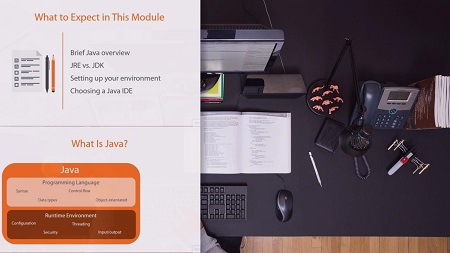
English | MP4 | AVC 1280×720 | AAC 44KHz 2ch | 7h 42m | 1.01 GB
This course provides complete coverage of the Java programming language and serves as a strong foundation for all Java-based development environments including client-based, server-side, and Android.
This course provides complete coverage of the Java programming language giving you the strong language foundation required for any Java-based development environment. Whether targeting a client-based, server-side, or Android environment, this course provides you with everything you need to quickly ramp up and become an effective Java programmer.
Table of Contents
1 Course Overview
2 Introduction
3 What to Expect in This Course
4 What to Expect in This Module
5 What Is Java
6 JRE vs. JDK
7 Demo – Setting up the JDK
8 Integrated Development Environments (IDE)
9 NetBeans IDE
10 Demo – Setting up IntelliJ IDEA Community Edition
11 Summary
12 Introduction
13 Demo – Creating Your First IntelliJ Project
14 Demo – Running from the Command Line
15 Statement Structure and Whitespace
16 Comments
17 Demo – Comments
18 Introducing Packages
19 Demo – Packages
20 Creating and Running a NetBeans Project
21 Summary
22 Introduction
23 Variables
24 Primitive Data Types
25 Primitive Types are Stored By-value
26 Arithmetic Operators
27 Operator Precedence
28 Demo – Operator Precedence
29 Type Conversion
30 Demo – Type Conversion
31 Summary
32 Introduction
33 Conditional Logic and Relational Operators
34 Conditional Assignment
35 If-else Statement
36 Block Statements
37 Demo – Nested If-statements
38 Block Statements and Variable Scope
39 Logical Operators
40 Demo – Logical and vs. Conditional Logical And
41 Demo – CalcEngine
42 Loops
43 Arrays
44 For-each Loop
45 Switch Statement
46 Demo – CalcEngine with Arrays, Loop, and Switch
47 Summary
48 Introduction
49 Classes
50 Using Classes
51 Encapsulation and Access Modifiers
52 Applying Access Modifiers
53 Naming Classes
54 Method Basics
55 Exiting from a Method
56 Method Return Values
57 Special References – this and null
58 Demo – CalcEngine with Classes and Methods
59 Field Encapsulation, Accessors, and Mutators
60 Demo – CalcEngine with Accessor and Mutators
61 Summary
62 Introduction
63 Establishing Initial State
64 Field Initial State and Initializers
65 Constructor and Adding Multiple Constructors
66 Chaining Constructors and Constructor Visibility
67 Demo – CalcEngine with Field Initializers and Constructors
68 Initialization Blocks
69 Initialization and Construction Order
70 Summary
71 Introduction
72 Parameter Immutability
73 Overloading
74 Overloading Walkthrough
75 Demo – CalcEngine with Method Overloading
76 Variable Number of Parameters
77 Summary
78 Introduction
79 Inheritance Basics and Typed References
80 Member Hiding and Overriding
81 Object Class
82 Equality
83 Special Reference – Super
84 Using Final and Abstract
85 Inheritance and Constructors
86 CalcEngine with Specialized Classes
87 Summary
88 Introduction
89 String Class
90 String Equality
91 String Representation of Non-string Values
92 StringBuilder Class
93 Primitive Wrapper Classes and Type Conversions
94 Using Primitive Wrapper Classes
95 Wrapper Class Equality
96 Final Fields and Enumeration Types
97 CalcEngine with More Data Type Capabilities Part 1
98 CalcEngine with More Data Type Capabilities Part 2
99 Summary
100 Introduction
101 Error Handling with Exceptions
102 Handling Exceptions by Type
103 Exceptions and Methods
104 Throwing Exceptions and Custom Exceptions
105 CalcEngine with Exceptions
106 Summary
107 Introduction
108 What Is a Package
109 Packages Create a Namespace
110 Determining a Type’s Package
111 Packages Provide Access Boundaries
112 Separating CalcEngine into Packages
113 Packages Act as a Unit of Distribution
114 Distributing CalcEngine as a Jar File
115 Summary
116 Introduction
117 Introducing Interfaces & Implementing an Interface
Resolve the captcha to access the links!